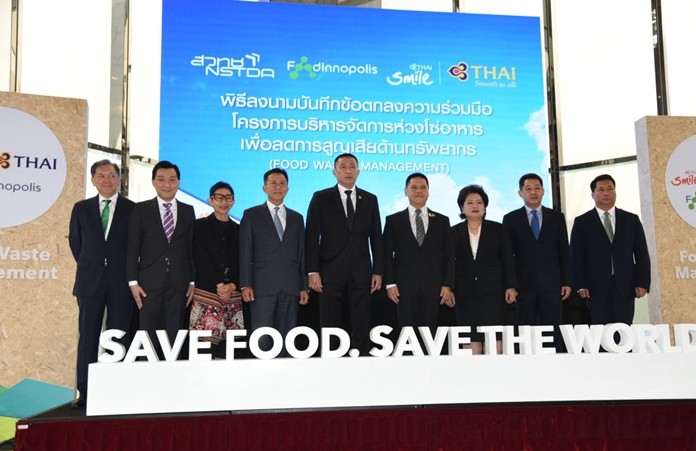
BANGKOK – Thai Airways International has joined the Food Waste Management program initiated by the Ministry of Natural Resources and the Environment (MSDHS) to minimize waste in food production, as the world is now faced with 1.3 billion tons of unmanageable food waste each year.
The Minister of Natural Resources and the Environment WarawutSilpa-archa, and the Minister of Transport SaksayamChidchob have announced the start of the Food Waste Management program to help reduce waste. The program is supported by Food Innopolis, the National Science and Technology Development Agency, Thai Airways International, and Thai Smile Airways.
The Minister of Transport said today that Thai Airways will improve its food production lines and supply chain management to reduce unnecessary waste, starting with ingredient sourcing, meal planning, cooking processes, and cabin loading.
The airline is working to reduce cabin waste and regulate the number of meals loaded onto each flight to minimize leftovers which often go to waste. Thai Airways has developed a Pre-Selected Menu option for passengers to book their meal preferences in advance, which will be introduced on Thai Airways operated flights to and from European destinations this year, and further extended to all flights next year. The airline expects this new service will help reduce by 20 percent the number of unwanted meals onboard, reduce 400 kilograms of ingredients daily, and saving 20 million baht each year.
The Minister of Natural Resources and the Environment says food waste is a pressing social issue yet to be properly managed, and can be a major source of greenhouse gas emission. The United Nations has estimated that 1.3 billion tons or one third of all food manufactured each year goes to waste, leading to one of the Sustainable Development Goals being to cut down of food waste by half by 2030.
In Thailand, food waste from consumed and unconsumed food accounts to 33-50 percent of all waste. The MSDHS aims to deploy innovations to help reduce food waste, such as by analyzing the ingredients used by airlines to produce meals and finding suitable technology to improve efficiency and reduce waste during the manufacturing process. Such technologies include a tool that can determine the ripeness of fruit, which can tell accurately at what stage most of the fruit can be used for cooking, reducing the discard rate which would have become waste.
 |
 |
 |





